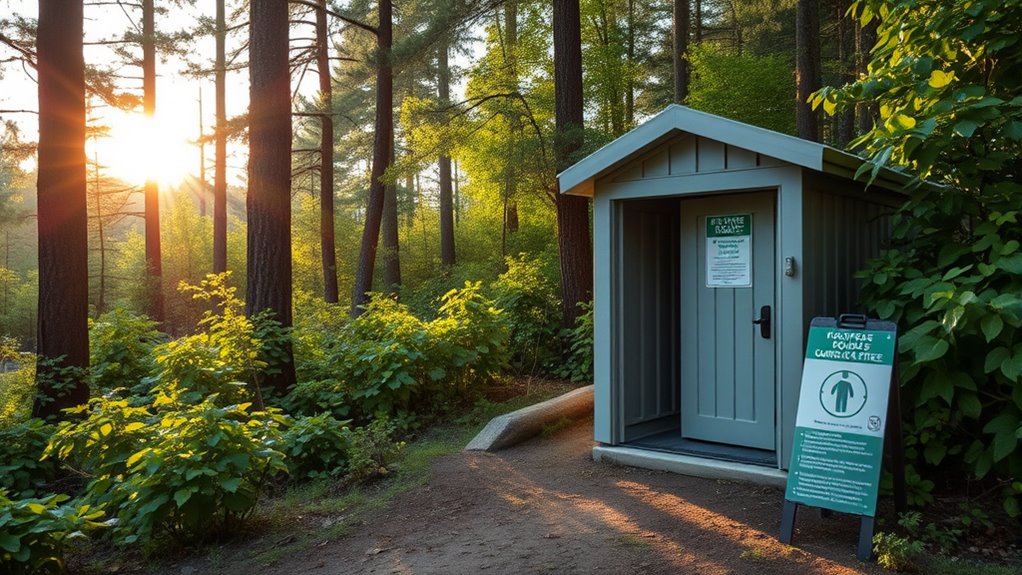To follow Leave No Trace sanitation principles during hosted experiences, you should plan to minimize waste, pack out all trash, and avoid contaminating water sources. Use designated waste and recycling containers, and educate your guests on proper disposal and hygiene practices. Maintain cleanliness by regularly sanitizing high-touch surfaces and providing handwashing stations. By prioritizing environmental health and responsible waste management, you create safe, respectful environments. Keep exploring how to implement these principles effectively in your next event.
Key Takeaways
- Properly dispose of all waste in designated containers, leaving no litter behind.
- Separate recyclables and compostables to minimize environmental impact during events.
- Minimize use of disposable items, opting for reusable alternatives whenever possible.
- Ensure all hygiene facilities are maintained and sanitized to prevent pollution and health risks.
- Educate guests about Leave No Trace principles and encourage responsible waste disposal practices.

Ensuring proper sanitation is essential for creating safe and enjoyable hosted experiences. When you’re responsible for managing an event or outdoor activity, it’s crucial to prioritize waste management and hygiene practices. These elements not only protect your guests but also demonstrate your respect for the environment and the community. Proper waste management involves planning ahead to handle trash efficiently, ensuring that waste bins are available, clearly marked, and regularly emptied. By doing so, you prevent overflow and reduce the risk of attracting pests or creating unpleasant odors. Remember, leaving no trace means you’re committed to minimizing your impact, so always bring enough containers for recyclables and organic waste, and encourage guests to dispose of trash properly. Incorporating recycling and composting practices can significantly reduce the environmental footprint of your event.
Prioritize waste management and hygiene to create safe, respectful, and environmentally friendly hosted experiences.
Hygiene practices are equally vital in maintaining a clean and safe environment. This means providing adequate handwashing stations or hand sanitizer dispensers at key locations, especially near food service areas and restrooms. Make sure these stations are stocked and accessible so that everyone can easily practice good hand hygiene. In addition, educate your guests on the importance of washing hands thoroughly after using the facilities or handling waste. It’s also important to regularly clean high-touch surfaces, such as tables, door handles, and shared equipment, to prevent the spread of germs. Keeping the environment hygienic not only safeguards health but also enhances the overall experience by creating a fresh, inviting atmosphere.
Implementing these sanitation principles requires a proactive approach. Develop a waste management plan that clearly outlines how waste will be collected, stored, and disposed of, and communicate this plan to your team and guests. Set up designated areas for waste separation to promote recycling and composting, reducing the overall footprint of your event. Additionally, establish routines for cleaning and sanitizing communal spaces to ensure consistency throughout the experience. These practices show your commitment to environmental stewardship and public health, which can substantially boost your reputation and guest satisfaction.
Ultimately, your goal is to create a hosted experience where everyone feels comfortable and safe. By diligently managing waste and practicing good hygiene, you set a standard of responsibility that aligns with Leave No Trace principles. Your efforts not only protect the natural environment but also foster a culture of respect and care among your guests. With thoughtful planning and continuous attention to sanitation, you can deliver memorable experiences that leave a positive impact—respectful of nature, considerate of others, and free from unnecessary waste or contamination.
Frequently Asked Questions
How Do I Handle Waste Disposal in Remote Locations?
You should use proper waste containment methods, like sealed containers or portable toilets, to manage waste in remote locations. Guarantee guest hygiene by providing handwashing stations and biodegradable supplies. Educate guests on waste disposal procedures, emphasizing minimal impact on the environment. Regularly check and maintain waste containers to prevent leaks or odors. By doing so, you keep the site clean, safe, and eco-friendly while respecting the natural surroundings.
What Cleaning Supplies Are Recommended for Outdoor Sanitation?
You should choose eco-friendly cleaning product types like biodegradable soaps, natural disinfectants, and reusable cleaning cloths. These options minimize environmental impact, protect local ecosystems, and guarantee safety for guests. Using natural and biodegradable supplies helps maintain the pristine outdoor setting while effectively cleaning surfaces and sanitation areas. Prioritize environmentally conscious choices to support sustainable outdoor experiences and reduce your ecological footprint, creating a safer, cleaner environment for everyone involved.
How Often Should Sanitation Stations Be Maintained?
You should maintain sanitation stations at least every two hours or as needed, especially during high-traffic periods. Regular upkeep ensures the portable handwashing stations remain clean and fully functional. Incorporate waste management strategies by promptly removing used supplies and sanitizing surfaces. Consistent maintenance helps prevent contamination, keeps guests safe, and aligns with Leave No Trace principles, guaranteeing your hosted experience is environmentally responsible and hygienic.
Are Biodegradable Products Necessary for Sanitation?
Think of biodegradable products as the gentle rain that nourishes the earth instead of overwhelming it. They’re not strictly necessary, but using biodegradable alternatives minimizes your environmental impact, helping to protect nature’s delicate balance. By choosing these eco-friendly options, you’re acting as a steward of the environment, ensuring your hosted experiences leave a light footprint. Embrace biodegradable products to keep the landscape pristine and inspire others to follow suit.
How Do I Educate Guests on Proper Sanitation Practices?
You should educate guests on proper sanitation practices by emphasizing guest hygiene and providing clear educational signage. Use simple, visual signs to demonstrate handwashing and waste disposal steps, making instructions easy to follow. Engage guests with brief explanations and friendly reminders, ensuring they understand the importance of sanitation. Regularly reinforce these practices, creating a clean environment while respecting Leave No Trace principles. This approach encourages responsible behavior effortlessly.
Conclusion
By embracing Leave No Trace sanitation principles, you become a steward of the environment, ensuring your hosted experiences leave no trace behind. Remember, your actions echo long after you leave, shaping the world for future explorers. Think of these principles as a shield—protecting nature and maintaining its beauty. When you respect these guidelines, you’re not just visiting; you’re preserving. After all, what’s more powerful than the ripple effect of your responsible choices?









